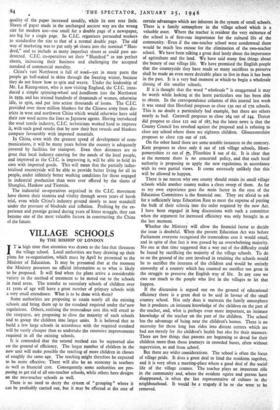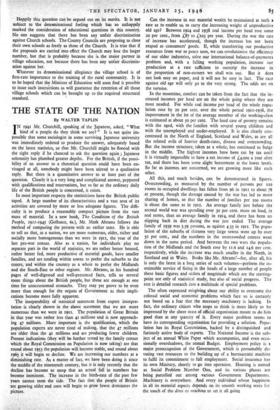VILLAGE SCHOOLS
By THE BISHOP OF LONDON T is high time that attention was drawn to the fate that threatens the village school. Local authorities are busy drawing up their plans for re-organisation, which must by April be presented to the Minister of Education. It may be presumed that at the moment the Ministry possesses no official information as to what is likely to be proposed. It will find when the plans arrive a considerable variety in the method of treatment to be meted out to the schools in rural areas. The transfer to secondary schools of children over it years of age will leave a great number of primary schools with a very small attendance. What is to be done with them?
Some authorities are proposing to retain nearly all the existing schools and bring them up to the standard required under the'new regulations. Others, realising the tremendous cost this will entail to the ratepayer, are proposing to close the majority of such schools and to group the children into larger units. It is believed that to build a few large schools in accordance with the required standard will be vastly cheaper than to undertake the extensive improvements required in all the existing schools.
It is contended that the second method can be supported also on the ground of efficiency. The larger number of children in the new unit will make possible the teaching of more children in classes of roughly the same age. The teaching might therefore be expected to be more effective: There will also be an economy in teachers as'well as financial cost. Consequently, some authorities are pro- posing to get rid of all one-teacher schools, while others have designs on the two-teacher schools as well.
There is no need to decry the system of " grouping " where it can be profitably carried out, but it may be effected at the cost of certain advantages which are inherent in the system of small schools. There is a family atmosphere in the village school which is a valuable asset. Where the teacher is resident the very existence of the school is of first-rate importance for the cultural life of the community. • Even if the one-teacher school were condemned there would be much less excuse for the elimination of the two-teacher school. We have been talking a great deal lately about the importance of agriculture and the land. We have said many fine things about the beauty of our village life. We have promised the English people that the countryside they have made so many sacrifices to preserve shall be made an even more desirable place to live in than it has been in the past. It is a very bad moment at which-to begin a wholesale closing of the smaller schools.
If it is thought that the word " wholesale " is exaggerated it may be worth while looking at the latest particulars one has been able to obtain. In the correspondence columns of this journal last week it was stated that Hereford proposes to close 130 out of 170 schools. This is no doubt a particularly bad example, but there are others nearly as bad. Cornwall proposes to close 164 out of 244. Dorset did propose to close 121 out of 187, but the latest news is that the County Council has revolted against the proposal and is refusing to close any school where there are eighteen children. Gloucestershire proposes to close 129 out of 216.
On the other hand there are some notable instances to the contrary. Kent proposes to close only 6 out of 126 village schools, Mont- gomeryshire ix out of 55, Flintshire 8 out of 62. It is clear that at the moment there is no concerted policy, and that each local authority is proposing to apply the new regulations in accordance with its own partial views. It seems extremely unlikely that this - will be allowed to happen.
There is no reason why one county should retain its small village schools while another county makes a clean sweep of them. As far as my own experience goes the main factor in the eyes of the Education Committees is the financial one. They are afraid to ask for a sufficiently large Education Rate to meet the expense of putting the bulk of their schools into the order required by the new Act. I have been engaged id long discussions with such a committee when the argument for increased efficiency was only brought in at the last moment.
Whether the Ministry will allow the financial factor to decide the issue is doubtful. When the present Education Act was before Parliament everyone recognised the tremendous cost it would entail, and in spite of that fact it was passed by an overwhelming majority. No one at that time suggested that a way out of the difficulty could be found by sacrificing the majority of the village schools. To do so on the ground of the cost involved in retaining the schools would be to sacrifice the interests of the children and would be entirely unworthy of a country which has counted no sacrifice too great in the struggle to preserve the English way of life. In any case we owe too much to the people who live in the villages to let that happen.
If the discussion is argued out on the ground of educational efficiency there is a great deal to be said in favour of the small country school. Not only does it maintain the family atmosphere but it produces tin intimate knowledge of the children on the part of the teacher, and, what is perhaps even more important, an intimate knowledge of the teacher on the part of the children. The school has the advantage of being near the children's homes. There is no necessity for those long bus rides into distant centres which are bad not merely for the children's health but also for their manners. There are few things that parents are beginning to dread for their children more than those journeys in crowded buses, often without supervision, to and from school.
But there are wider considerations. The school is often the focus of village pride. It does a great deal to bind the residents together, and it is very often a meeting-place where a good deal of the social life of the village centres. The teacher plays an important role in the community and, where the resident squire and parson have disappeared, is often the last representative of culture in the neighbourhood. It would be a tragedy if he or she were to be removed. Happily this question can be argued out on it merits. It is not subject to the denominational feeling which has so unhappily marked the consideration of educational questions in this country. No one suggests that there has been any unfair discrimination against Church schools. The County Councils are proposing to close their own schools as freely as those of the Church. It is true that if the proposals are carried into effect the Church may lose the larger number, but that is probably because she is the major partner in village education, not because there has been any unfair discrimin- ation against her.
Whatever its denominational allegiance the village school is of first-rate importance to the training of the rural community. It is to be hoped that the Minister of Education will soon find it possible to issue such instrtictions as will guarantee the retention of all those village schools which can be brought up to the required structural standard.































 Previous page
Previous page